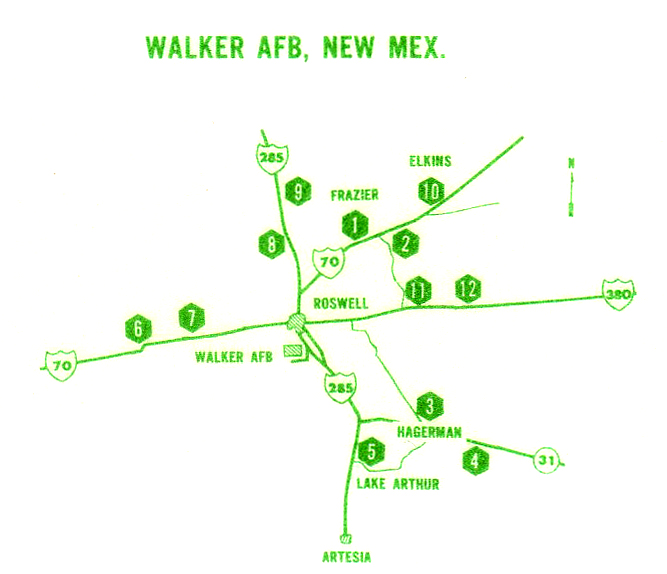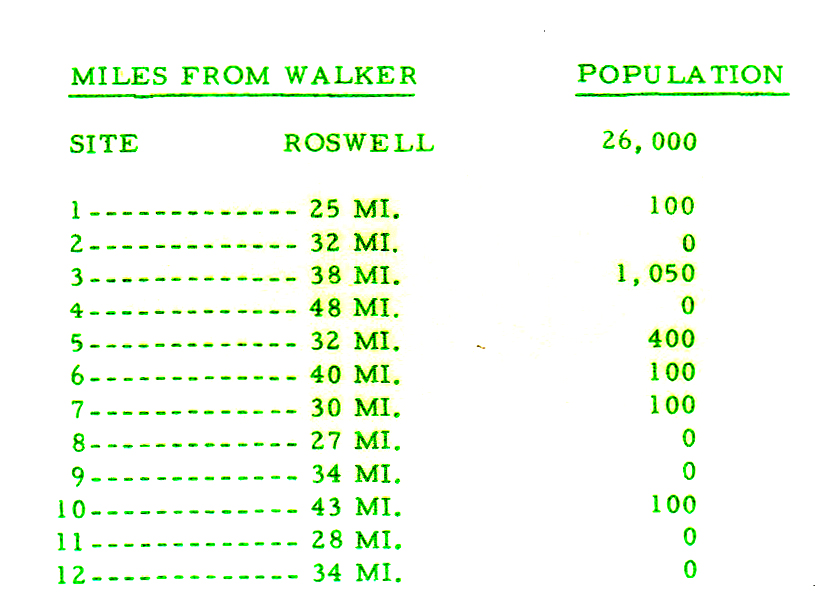Atlas at Walker Air Force Base New Mexico
Built in World War II, the base became a SAC bomber base in the post-war era. For a few short years it hosted another type of strategic weapon-the Atlas missile.
With the decision to construct Atlas lift-silos around Roswell reached in January 1960, the Corps of Engineers Albuquerque District commissioned soil samples that verified that the region could geologically sustain the underground complexes. The Albuquerque District then acquired the 12 sites surrounding Roswell and on May 16, 1960, advertised for bids to convert the Bechtel Corporation blueprints into reality.
On June 15, 1960, a joint venture consisting of Macco Corporation, Raymond International, Inc., The Kaiser Co., and Puget Sound Bridge and Dry Dock Co. was announced as the winning bid. Work started a week later. In November 1960, as construction continued, the Albuquerque District transferred responsibility for construction to the Corps of Engineers Ballistic Missile Construction Office (CEBMCO) based in Los Angeles.
The last site was completed on January 6, 1962, 57 days behind schedule. As at other sites, constant design changes resulting from the "concurrency" concept as well as some labor-management problems added days to the construction schedule.
During the project there were six walkouts, which led to a total of 2,512 man-days lost. Several accidents resulted in fatalities. Seventy-four disabling injuries contributed to 51,086 man-days lost on the job.
Reportedly, the first Atlas missile to arrive in Roswell received a welcoming parade. New Mexico's Governor Mecham gave the keynote speech at a Site 10 ceremony held on October 31, 1961, in which CEBMCO turned the site over to the Air Force. Although Cheves County residents took patriotic pride in the news of the missile squadron's arrival, Roswell residents submitted 10 permit requests for bomb shelters in October 1961 as construction went ahead. The 579th SMS received its first missile on January 24, 1962. In April 1962, a completed liquid oxygen plant built at Walker AFB was turned over to the Air Force. The squadron completed missile installation approximately 1 month before the Cuban Missile Crisis.
Roswell's sites developed a notorious reputation due to three missile explosions. On June 1, 1963, launch complex 579-l was destroyed during a propellant loading exercise. On February 13, 1964, an explosion occurred during another propellant loading exercise, destroying launch complex 579-5. Again, a month later, on March 9, 1964, silo 579-2 fell victim to another explosion that occurred during a propellant loading exercise. Fortunately, these missiles were not mated with their warheads at the time of the incidents. The only injury reported was that of a crewman running into barbed wire as he fled a site.
The accidents at Walker and at other Atlas and Titan I sites accelerated the decision to deactivate these systems. After the Air Force removed the missiles in 1965, the dozen sites reverted back to private ownership. Within a year of the deactivation of the 597th SMS, the Air Force announced that the base would be closed. This occurred on June 30, 1967.
It should be noted that in 1960, two above-ground Army Nike Hercules sites were constructed, but the missiles never came. Two months after activation in April 1960, the Headquarters unit deactivated.


Look here for general information on Walker AFB